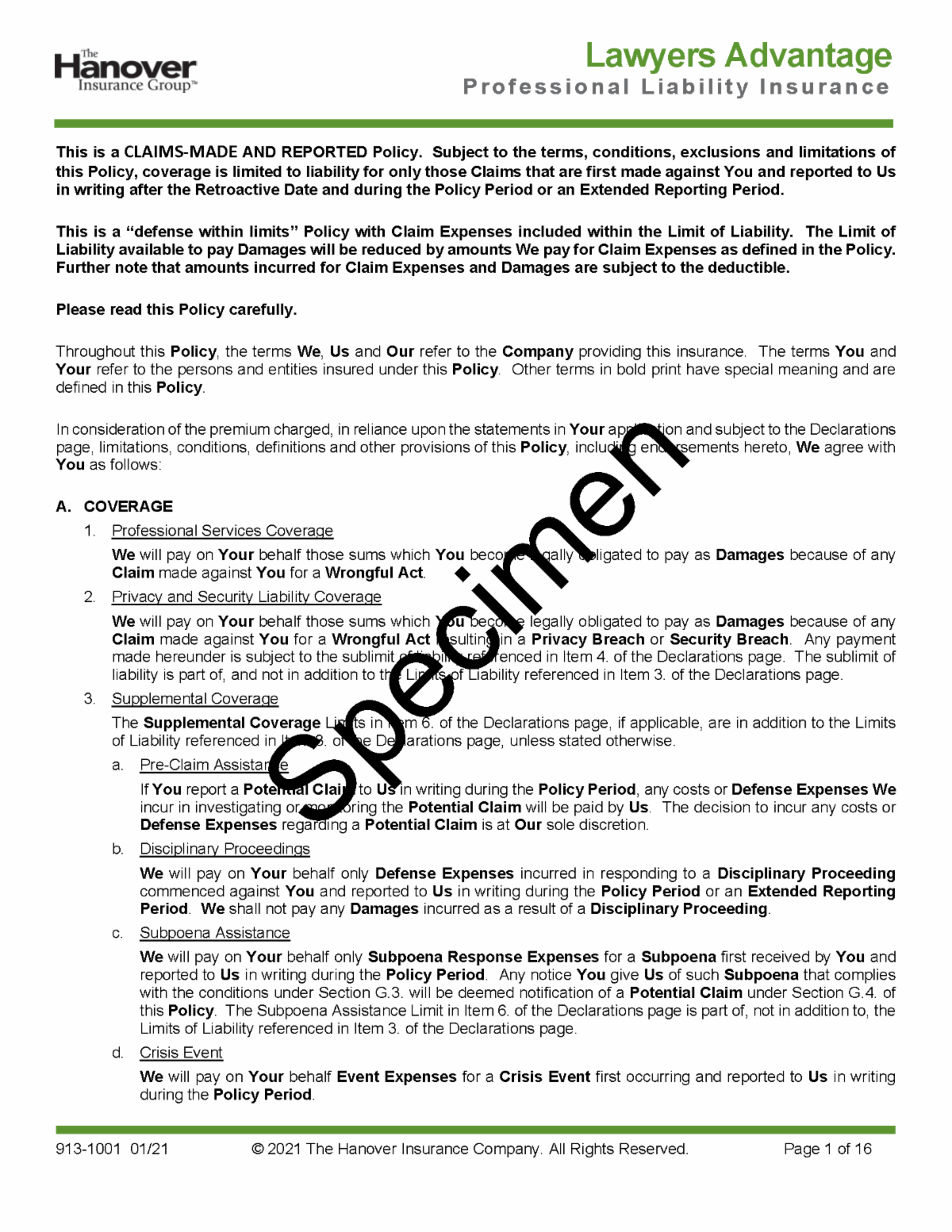
Attorney Malpractice Insurance Policies are claims-made and reported policies. When the coverage ends the ability to report claims for past acts ends at policy termination. Attorneys leaving private practice via retirement, becoming a judge or working in the private or public sector need to protect their past acts. Insurers will not renew attorney malpractice policies for attorneys that are no longer in private practice. Given this it is important for attorneys to protect their past acts once coverage ends. For solo practitioners and small firms that may close once the practitioner leaves, the nonpracticing Extended Reporting Period Endorsement/Retirement Tail (ERP) may be an answer.
Note: For attorneys closing or leaving their small firm to work at another law firm the nonpracticing Extended Reporting Period Endorsement/Retirement Tail (ERP) is not an option. Coverage for their past acts is outside of the scope of this blog.
Each insurer’s policy differs on requirements and wording for obtaining this valuable ERP endorsement at no or reduced cost. Careful planning by the attorney may save the attorney thousands of dollars. The ability to request an ERP differs by insurer but is time sensitive. Regardless of the insurer, the attorney must completely stop private practice to obtain the nonpracticing ERP.
The Hanover policy provides a nonpracticing ERP based on the following policy language:
F. EXTENDED REPORTING PERIODS
4. Death or Disability Extended Reporting Period
If, during the Policy Period, You, who are an owner, partner, officer, director, shareholder, associate, manager, member or employee of the Named Insured, die or sustain a Total and Permanent Disability and otherwise meet Our eligibility requirements, We will issue a death or disability Extended Reporting Period endorsement without additional charge. The death or disability Extended Reporting Period provides an extension of the reporting period for a Claim or Disciplinary Proceeding first made against You during the death or disability Extended Reporting Period and reported to Us during the death or disability Extended Reporting Period, provided the Claim is for a Wrongful Act, or the Disciplinary Proceeding is for a Professional Service, of such Insured but only for Wrongful Acts or Professional Services wholly committed prior to the date You die or sustain a Total and Permanent Disability, and otherwise covered by the Policy. The death or disability Extended Reporting Period expires when the executor or administrator of Your estate is discharged or Your Total and Permanent Disability ends. The death or disability Extended Reporting Period provides no coverage to any other Insured. Coverage only applies to the Named Insured, including any obligation of the Named Insured to indemnify You, if You are the Named Insured or a solo practitioner. You or Your estate must, as soon as practicable but no later than sixty (60) days after the Policy Termination Date, notify Us in writing if this coverage is desired. This death or disability Extended Reporting Period does not apply to Claims or Disciplinary Proceedings made during the Policy Period, any subsequent renewal of this Policy, or any optional Extended Reporting Period that applies to this Policy or any renewal of this Policy, nor will it apply to Claims or Disciplinary Proceedings that are covered under any other subsequent insurance available to You, or that would be covered but for exhaustion of the amount of insurance applicable to such Claims or Disciplinary Proceedings.
We also require:
a. Written proof of Your Total and Permanent Disability, including the date it happened, certified by Your attending physician. You agree to submit to medical examination(s) by any physician(s) We designate if requested; or
b. Written proof of the date of Your death; and
c. The death or disability was not caused by a self-inflicted injury, or misuse or abuse of any substance.
5. Retirement Extended Reporting Period
If, during the Policy Period, You, who are an owner, partner, officer, director, shareholder, associate, manager, member or employee of the Named Insured, retire completely from rendering Professional Services, have been continuously insured by Us under a Professional Liability Insurance policy for the immediately preceding three (3) full years, and otherwise meet Our eligibility requirements, We will issue a retirement Extended Reporting Period endorsement without additional charge. The retirement Extended Reporting Period provides an extension of the reporting period for a Claim or Disciplinary Proceeding first made against You during the retirement Extended Reporting Period and reported to Us during the retirement Extended Reporting Period, provided the Claim is for a Wrongful Act, or the Disciplinary Proceeding is for a Professional Service, of such Insured but only for Wrongful Acts or Professional Services wholly committed prior to the date You retired from the Named Insured, and otherwise covered by the Policy. The retirement Extended Reporting Period provides no coverage to any other Insured. Coverage only applies to the Named Insured, including any obligation of the Named Insured to indemnify You, if You are the Named Insured or a solo practitioner. You must, within sixty (60) days after the Policy Termination Date, notify Us in writing if this coverage is desired. This retirement Extended Reporting Period does not apply to Claims or Disciplinary Proceedings made during the Policy Period, any subsequent renewal of this Policy, or any optional Extended Reporting Period that applies to this Policy or any renewal of this Policy, nor will it apply to Claims or Disciplinary Proceedings that are covered under any other subsequent insurance available to You, or that would be covered but for exhaustion of the amount of insurance applicable to such Claims or Disciplinary Proceeding.
We also require that:
a. You are fifty-five (55) years of age or older; and
b. Your Policy was not cancelled (unless reinstated) for non-payment of premium.
The retirement Extended Reporting Period expires when You resume rendering Professional Services, other than pro bono services on behalf of a Non-Profit Entity. Pro bono services do not include services that are compensated in any way. Compensation includes free office space, health care and other benefits.
6. Additional Conditions for Extended Reporting Periods
a. If You are subject to threatened, pending or actual disciplinary action, including the loss, suspension, revocation or surrender of their license, the Extended Reporting Periods outlined in paragraphs 3., 4., and 5. above are not available for You. If You are the Named Insured or a solo practitioner, the Extended Reporting Periods outlined in paragraphs 1., 2., 3., 4., and 5. above are not available.
b. If there is other insurance in effect on or after the Extended Reporting Period inception date which covers You for the liability or Claim, then that other insurance shall render the Extended Reporting Period inapplicable, even though the Limits of Liability of the other insurance may be inadequate to pay all Loss or Claims.
c. The Extended Reporting Periods do not extend the Policy Period or change the scope of coverage provided. There are no separate, additional or reinstated limits of liability for the Extended Reporting Periods.
IV. DEFINITIONS
Extended Reporting Period means an additional period of time for reporting Claim(s) and Disciplinary Proceedings.
Insured, also referred to herein as You or Your, means the Named Insured and:
1. Any Predecessor Firm;
2. Any individual, who was, is or becomes an owner, partner, officer, director, shareholder, associate, paralegal, manager, member or employee of the Named Insured, solely while acting in a professional capacity on behalf of the Named Insured or a Predecessor Firm;
3. The Named Insured’s part-time, intern, temporary or leased employees, but only while acting on behalf of the Named Insured;
4. Your lawful spouse or Domestic Partner, solely for liability arising from any Wrongful Act of an Insured committed without the participation of such spouse or Domestic Partner;
5. Your heirs, assigns, and legal representatives in the event of Your death, incapacity or bankruptcy to the extent that You would have been covered; or
6. A past or present Independent Contractor or Of Counsel attorney, but solely while acting in such capacity on behalf of the Named Insured.
Insured does not mean any title agency, title insurance company or any other entity on whose behalf an Insured acts as a title agent or designated issuing attorney, unless specifically scheduled as an Insured on this Policy.
Named Insured means the sole proprietor, entity, partnership, or corporation designated on the Declarations page.
Switching insurers near retirement to save a few dollars may cost an insured attorney thousands of dollars to buy the same protection. Planning retirement or a transition out of private practice should be discussed with your malpractice insurance agent prior to ending private practice when possible.
CLICK HERE TO OBTAIN AN ATTORNEY MALPRACTICE QUOTE

Lee Norcross, MBA, CPCU
(616) 940-1101 Ext. 7080